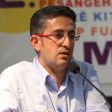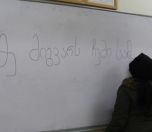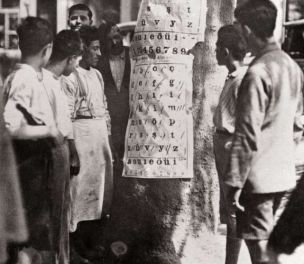Click to read the article in Turkish
The third most spoken language in today's Türkiye after Turkish and the Kurmanji dialect of Kurdish is the Zaza language. The Zazas name themselves Zaza, Kird, Kirmanc, Dimilî or Share Ma, and their language as Zazakî, Kirdkî, Kirmanckî, Dimilkî or Zonê Ma depending on differences in location or religious sect. However, with increasing urbanization and developing mass media, the name Zaza became more widely used and also started to be used in all regions where the Zazas live. Although we cannot name a single-piece region where the Zazas live, the Zazas are mostly located in the east and southeast regions of Türkiye.
Bingöl and Dersim [Tunceli] provinces are where the Zaza population lives mostly. A significant Zaza population also lives in Elazığ, Diyarbakır, Şanlıurfa, Sivas, Adıyaman, Erzincan, Erzurum, Muş, and Bitlis provinces, and a considerable population in the metropolitan cities of Türkiye and in many countries in Europe. We have to tell that the researchers studying the Zazas give figures ranging from two million to six million for the Zaza population, but these figures are only estimates.
Denial, bans, and censorship
The Republic of Türkiye which was founded as a nation-state on the remains of an emperorship struggled hard to exclude languages other than Turkish from public life shortly after its foundation. The Kemalist regime imposed denial, bans, and censorship of languages other than Turkish in almost all spheres of public life.
Kemalists endeavored to eliminate all languages other than Turkish using the constitution and the laws first of all and also the schools, the institutes (Girl's Institutes, Advanced Technical Schools for Girls, Village Institutes), Association for Investigation of Turkish language (later Turkish Language Society), Turkish Historical Society, Public Inspectorships, Turkish Hearts, Community Centers/Community Rooms and Nation Schools.
Besides fines were imposed for those speaking a language other than Turkish with decisions taken in the provincial councils and municipality councils. Such council decisions were banning Zaza language, such as many other languages in the country to be spoken in public institutions such as schools, hospitals, municipalities, courthouses, prisons, etc. but also in marketplaces, on the street, in a cafe, so everywhere in daily life.
Of course, all these decisions banning languages other than Turkish by "laws" or administrative decisions were largely rejected by the Zaza speakers, and the Zaza language continued to exist to a large extent despite all denial, bans, censorship, and oppression.
However, it is another reality that the percentage of those among the younger generations who spoke/learned the Zaza language dropped rapidly with the fast urbanization, schooling, literacy, migration from villages to the cities, the burning/emptying of the villages, and the spreading of the means of communication such as the television, radio, newspapers, and internet after 1980s in the regions where the Zaza population lives, similarly with the whole of the Kurdish majority region.
Written Zaza language very late
Zaza language was first written later than the languages of the other communities in the Middle East and the Balkans. There are various reasons for this. The first things that come to mind are that most Zazas lived in the countryside, that they were distant to urbanization, schooling, and deprived of print houses or press.
What is more important is that Arabic and Persian languages were dominant in the regions where Zazas lived in the period of the emperorship. Therefore there were no "kings to present eulogies to" and therefore no literature based on patronage. This delayed the Zazas to begin writing their language and their written literature. And in the period of the nation-states, the Zazas did (could) not have a political status. Zaza was spoken only in Türkiye and the Kemalist regime had a monolinguist policy. Strict bans on languages and cultures were therefore imposed for decades preventing the written Zaza language to emerge. To be more precise, the bans and assimilation policies in Türkiye made it difficult for Zaza literature to institutionalize and a press to emerge.
It was therefore almost impossible for works in the Zaza language or literature works to be written and published. This delayed the first writing of the language and made it difficult for it to become a written language with written literature.
Despite all, the works in the Zaza language published in Europe after 1980, and starting with the 2000s in Türkiye allowed a written Zaza language to emerge and a Zaza language publication/literature to be constituted, even if late. However, we have to say that these were publications/literature that were produced with the efforts of individuals rather than institutions.
So even if the first text in the Zaza language was written in a late period (1899), today there are many written works in the Zaza language including interpretations of religious texts, Islamic law, Prophet Muhammed's sayings, poems, novels, and stories and beyond doubt, they are important for written Zaza to strenghten.
Political and bureaucratic obstacles
Additionally, we have to say that the opening of Zaza Language and Literature departments in the Bingöl and Munzur universities, the elective Zaza language courses offered in primary education, and then the opening of post-graduate study programs in the Zaza language in some universities also made significant contribution for the language to come into sight in the press and in daily life.
However, we also have to note that there are still some political and bureaucratic obstacles in relation to these initiatives and that even the means provided officially turn out difficult to use.
If we should list such obstacles, we can tell that only one or two Zaza language teachers are appointed in a year, that there are no/insufficient teachers to teach the elective lessons, and that the school administrations are creating barriers to students who want to choose Zaza language as the elective lesson, and again that those who do their graduate/post-graduate studies in the Zaza language are having difficulty finding a position in the academy or in different public institutions.
Again while the linguistic standardization of many languages in the world has been completed today, no agreement has yet been reached for a standard alphabet and written language of the Zaza language and literature, in which the works are produced mostly by individual efforts. This is an important obstacle to the development of the written Zaza language and it also prevents/will prevent literacy in the language to develop. In other words, it is a reality today that many researchers that accept the Zaza language as a language or a dialect are not using a standard Zaza language.
Agreement needed over Zaza alphabet & writing
What is worse is that a little number of people who write in the Zaza language still do not have an agreement on a Zaza alphabet. The Bedirhan Alphabet is mostly used, but other than that, the Jacobson Alphabet and some individual alphabets are also used in written Zaza works. This of course is the biggest obstacle to the creation of a standard written Zaza language.
The first thing that those who write in the Zaza language should do is to reach an agreement on written Zaza. Literacy in the language can become more widespread and the language can be transferred to the younger generations only after this. Otherwise, the Zaza language will be the victim of the ambitions of a few people and groups.
The cold truth we are facing is that the struggle of the Zaza language between death and life for decades will result in death in these circumstances. Then what the Zazas will do in the near future will be to cry after the funeral of the Zaza language, we should keep this in our mind.
So the greatest task for the Zazas today is to ensure that the Zaza language which faces the risk of becoming extinct should live. If the conscience and sensitivity for the Zaza language is not developed in the short and middle term, and if the right to education in the mother tongue is not obtained, there is a high risk that the Zaza language will take its place in the graveyard of dead languages.
Risk of becoming extinct
A language crisis is experienced in many different places of the world today. The greatest problem for the Zaza language is that it risks extinction. According to the Atlas of the World's Languages in Danger published by UNESCO on February 21, 2009, one of the languages in danger in Türkiye is the Zaza language. UNESCO classifies languages bearing the risk of extinction as "vulnerable," meaning that most children speak the language, but it may be restricted to certain domains."
Although the death of a language is something repeated throughout history, today globalization, the nation-state, nationalism, urbanization, schooling, widespread literacy, and the advance in communication technologies paradoxically both accelerate the death of languages and also contribute to saving them/keeping them alive.
Today "death of languages" is not independent of nation-states. It is directly related to the assimilation policies, attitudes that ban, exclude, and prevent the use of languages, carried out by nation-states for languages other than the national language. Banning a language, and not using it in publications, education, or in the market, are among the many factors causing the "death of languages" today.
Linguistic suicide
What the Zaza language is facing today is both a "language death" due to the policies and practices of the state and also a "linguistic suicide" due to the attitudes of the Zazas to their own language.
Linguistic suicide is defined as the speakers of a language stopping to speak their language not as a result of "loss of the language" or due to "language erosion" but by stopping to transfer their language to the next generations with the influence of the dominant language and culture.
One most important reasons why the Zaza language is left to die today is that the Zazas do not care enough about speaking, writing, and reading in their language and that they leave their language to die through "linguistic suicide." "Language loyalty" and "language conscience" should develop among the Zaza society in order to save the language from "linguistic suicide."
Of course, the "linguistic suicide" of the Zaza language is also the result of one century of policies and practices pursued by the state, and also that the language on the street was Turkish. Just as Umberto Eco has properly stated, the children have to adopt not the language of their mothers, but that of the street.
Additionally, the fact that the Kurdish political movement in Türkiye, the municipalities, the civil society organizations, the publishing houses, the press are also neglecting the Zaza language, or not showing interest in the language sufficiently -excluding some Kurdish institutions- also has an effect on the Zaza language being vulnerable and facing the risk of extinction.
"Only if it is the language of the children..."
As is known, what determines if a language is going to die or live, is the transfer of the language between generations. In other words, a language can be saved from the risk of extinction/death if it can become the language of the children. On the other hand, if there is an interruption in the transfer of a language between generations, if it is used less among the next generation, that language risks death/extinction. This is the problem that the Zaza language is facing today.
Today the Zaza language is almost not spoken at all by those under thirty. This of course shows us that the threat the language is facing is great. A child can transfer a language to the future only by receiving education in that language. The fist thing to do is to ensure that the Zaza language becomes prestigious and that education in the mother tongue started as soon as possible. Only in this way can the Zaza language be the language of the children again and hold on to life.
It is beyond doubt that first of all the state and all other shareholders should create the conditions for the Zaza language and culture to stay alive and support the scientific/academic works on Zazas and the Zaza language. This is extremely important when we take into consideration all the above problems.
Zaza language can hold onto life
There are things that can be done in order to make the Zaza language prestigious. If the people speaking this language have an important status in society, if they are prestigious and rich, if they use technology well, and if they have a presence in the education system, these will all help. But the most important and first condition for a language to stay alive is that it should be an education language, in other words, there should be education in the mother tongue in that language.
Risking repetition, the Zaza language can only hold on to life and continue to exist if we have education in the mother tongue. Just as John Breuilly emphasizes, only the states are able to organize education in the mother tongue and massive literacy in a language. If this is not the case, we will soon be losing our souls together with our language. As Oliver Wendell Holmes says "Every language is a temple, in which the soul of those who speak it is enshrined." (EÇ/AÖ/PE)
One century, one regime, and the right to mother tongue





.jpg)




sasa.jpg)
